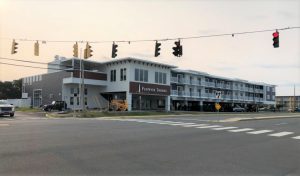
FENWICK ISLAND – With approval to license the facility’s interior for alcohol sales and consumption, the connections of a new Fenwick Island hotel now await a state commissioner’s decision regarding a second-floor pool deck.
In a seven-hour-long public hearing Tuesday, the Delaware Office of the Alcoholic Beverage Control Commissioner (OABCC), headed by Commissioner John Cordrey, granted Sands Fenwick, Inc. a license to allow the sale and consumption of alcohol inside the new Fenwick Shores hotel in Fenwick Island.
However, a decision to license the hotel’s second-floor pool deck was deferred until the agency could further review evidence and testimony provided by more than 100 residents and property owners both for and against the application.
“Clearly, I can in no way make a decision this evening based upon the information I have learned over the past seven hours, with the exception that there has been absolutely no evidence I find credible that indicates that the interior of the hotel should not be licensed,” Cordrey said this week. “Therefore, I am going to license the interior of the hotel and that will be done immediately.”
In 2018, local developer Spiro Buas demolished the aging Sands Motel, which is located along Coastal Highway in Fenwick Island, and began building a new hotel in its place.
Fenwick Shores – a 65-room boutique hotel developed under Hilton’s Tapestry Collection brand – opened to the public last week. In addition to its guest rooms, the hotel features a gym, event space and an outdoor pool, as well as food and beverage operations near the ground floor lobby and on the second-floor pool deck.
“To be clear what we want here is a first-class operation, and there will be nothing less,” Spiro said this week.
To allow alcohol service for hotel guests, Buas applied with the OABCC for a hotel liquor license earlier this year. The application also seeks a patio permit and variance to permit live entertainment, external speakers, a paging system and a wet bar on the second-floor patio of his property.
Since that time, however, several property owners have voiced their objections to the developer’s request. Attorney William Rhodunda, representing several property owners concerned about the pool bar with the potential for live or recorded music, argued this week the outdoor amenity would adversely impact neighboring property owners.
“The issue here is the accessibility to this party area, and it appears there is open access to this area where you don’t have to go through the hotel lobby,” he said. “What our concern is here is that this is essentially a neighborhood bar.”
Buas’ attorney, Tim Willard, disagreed.
“Mr. Buas has testified this hotel is designed for guests, which doesn’t exclude guests that don’t have a room …,” he said. “Mr. Rhodunda can speculate about it turning into a wild Dewey night club, but the physical layout doesn’t pan out to that.”
Rhodunda noted his clients were not opposed to a liquor license for the first-floor bar and restaurant, but were opposed to a license for the second-floor pool deck, as well as the associated music and paging system. James Street resident Jacque Napolitano, whose property sits directly behind the Fenwick Shores, said as much in her testimony this week.
“I’m very concerned, she said. “It looms right above my home, particularly my bedroom. If they get this outdoor liquor license for the pool bar I could be kept up all night from the noise and music emanating from the upper level night club atmosphere … I’m concerned about its impacts on our neighborhood as well.”
While he has requested the OABCC grant his application, Spiro noted he had voluntarily placed a restriction on his license for outdoor live entertainment to alleviate some of the town’s concerns.
“The mayor had some concern of live entertainment in the outdoor area, so I offered this compromise …,” he said. “What I requested was that my liquor license be restricted so that any live entertainment outdoors would first need to go in front of the city council for their approval.”
Resident Reid Tingle, who lives directly north of the hotel on the corner of James Street and Coastal Highway, said he had no objections to Buas’ application.
“The road noise is incredible on this intersection,” he noted. “I don’t think you’ll hear anything, conversations or bar noise, because of the road.”
The virtual public hearing, scheduled in response to written opposition from community members, lasted nearly seven hours and delved into issues such as management, occupancy, noise and public access to the hotel’s food and beverage areas.
In his closing statement, Willard argued the property owners’ concerns regarding the outdoor pool bar were speculative.
“A license is just that, an ability to operate,” he said. “But you, as the commissioner and the authority for liquor in the state, have the authority to take away that license if there are any problems. When you are anticipating how this is going to impact quality of life, I don’t think you have any evidence. All you have is speculation.”
Rhodunda, however, argued the applicant had not provided proof that the liquor license was necessary to operate, not did it provide a business plan that outlined hours of operation and crowd management.
“The applicant has an obligation going forward to show good cause to need these things,” he said. “The applicant has completely failed to state good cause.”
Cordrey told attendees he would consider the arguments both for and against the application before making his decision on the second-floor pool deck requests.
“I will consider the various evidence, the testimony I have here as well as the various exhibits that were presented, and I will make a decision regarding the rest of the application at a point in the future,” he said.

